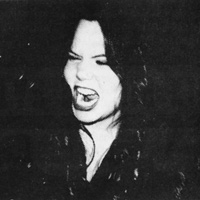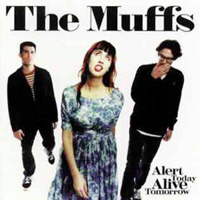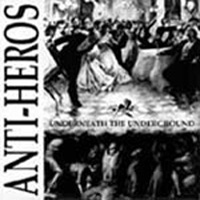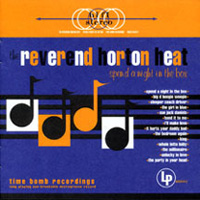 The Reverend Horton Heat
The Reverend Horton Heat
Spend a Night in the Box (Time Bomb)
An interview with the good reverend Jim Heath
by Scott Hefflon
Your album hasn’t hit the streets yet, but you’re on tour already?
We tour all the time. Most bands tour when they release their albums, we tour all the time, and sometimes we release an album.
This is the third record label you’ve been on?
Yup. The thing that’s really cool about our whole deal with Time Bomb is that for the first time in my career, I’m on a label where we’re right up there as the top dogs. At Interscope, they treated us like we were a nuisance. SubPop used to pay us lip service and tell us how important we were to the label, but we were never a main thing at the label. So now here we are, a few years later, and we’re either the second or the third largest band on SubPop. It’s us, Nirvana and Soundgarden, though I’m not sure SubPop ever did a full-length for Soundgarden. When we were with SubPop, they treated us like we were kind of a novelty, and they’d blow us off because there was some big, important meeting with Love Battery or something.
At Time Bomb, it’s basically your band and Mike Ness, right?
Pretty much. So it’s really great to have a label that’s right there with us. The guy who owns Time Bomb, Jim Guerinot, used to be the General Manager at A&M Records, and he wanted to sign us back when we decided to go with Interscope. I think our career would’ve been a lot different if we’d signed with them then. Hindsight’s 20/20…
You may’ve ended up in the same place, seeing as A&M and Interscope (and a lot of others) are all now part of Universal Music Group…
To tell you the truth, we saw the writing on the wall well before a lot of other bands. We said we wanted out of our deal, and we knew they were going to start dropping bands anyway. We were never really happy at Interscope anyway.
Did you fulfill the contract? You did three records with them…
They have options on seven, or something like that. It’s one of those “major label”-type contracts. But the funny thing is, they didn’t live up to their end of the contract either. They were supposed to promote two singles off each album, two videos each with a budget of $20,000, and they didn’t do any of it. Videos aren’t really that important to us, but when it’s in the contract and a company as huge as them says, “Uh, no,” and flicks us off like a fly on flypaper… The truth is, we were trying to work with those guys even though they dropped the ball completely. They didn’t see this whole hot rod culture thing coming. It’s really a statement as to the way corporate America can really screw up artists. If they’d wanted to spend the money, we could’ve gotten a lot more radio play. But you have to pay the stations their advertising dollars to get radio play, and they didn’t want to do that. So fine, we’re not on their stinkin’ label anymore.
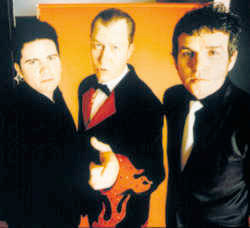 Do you think the records themselves were compromised by Interscope’s meddling?
Do you think the records themselves were compromised by Interscope’s meddling?
Man, you would not believe… I had to fight tooth, nail, and claw on every record we did with them. They sit around on their high horse, thinking that they’ve made billions of dollars at Interscope because of their good artistic sense, but not one of them saw the swing thing about to happen. They were telling us to get all the rockabilly and swing out of the songs. They’re picking through the songs saying, “No, no, no, yeah! This one is pretty good, it doesn’t sound like you at all.” They were too busy buying fanny packs at the Lilith Fair to see the whole hot rod culture thing taking off.
So Time Bomb knows hot rod culture is where it’s at, and they give you control of your stuff, cuz you’re no spring chicken; you know what you’re going after…
It all dates back to the ’50s: Elvis Presley signed to RCA, and the first song he wanted to release as a single was “Heartbreak Hotel.” But guess what?, RCA didn’t like that song. It’s fuckin’ “Heartbreak Hotel,” ya know? But they tried to rush him through because they knew he on top of things. When a band like us goes in and says, “We think this song is pretty cool,” they aren’t trying to rush us like we’re the next big thing. They sit around saying, “Well, if you keep suggesting stuff like this, we’re going to drop you.” It’s been a ridiculous trip into ineptitude.
People seem to think there was a Golden Age where everything was pure – and not just in music, but in TV and movies, as well as everything else – but the business has been corrupt since its inception.
Yeah, it has been. You think back to the ’20s when label execs thought Black artists would never be able to sell a lot of records. And then when they figured out that they could, they hoped on white people who sounded like Black performers. And that was the whole start of rock’n’roll. Elvis was really a rockabilly. What happened to a lot of the wild-ass rockabilly was that corporate America discovered it, then made their own version of it, like Frankie Avalon and Fabian. That’s one of the reasons I latched on to rockabilly… It was a very small segment of time, there at the creation of rock’n’roll, but it got denied its moment in the sun. And the Beatles, while they saved rock’n’roll to a degree, they turned their back on it, too. And then in the ’60s, our rock stars aren’t really rock’n’rollers, anymore. They’re folk types with electric sitars. And the record labels are claiming that rock’n’roll is about The Mamas and the Pappas and Strawberry Alarmclock, and geez, to them, Jerry Lee Lewis is just some old guy. The kind of fire that Jerry Lee Lewis had, and Little Richard had, and Elvis had – the fire that created rock’n’roll – they managed to squash that by making rock’n’roll into a commodity they could make a lot of money from.
That’s still going onto today, and I think it’s something young people just don’t realize. They don’t realize that when they turn on The Edge radio station, and they’re listening to Alex from The Edge, he has no say-so whatsoever in what’s played on the station. And even the program director, the guy who used to be all all-powerful, HE doesn’t even have say-so anymore. What happens is that the advertising department sees that Marilyn Manson is coming through town, so they call up the record label and ask if they’re going to be doing any advertising to support the tour. The label says “Yeah, we’re going to spend $35,000 advertising.” And the radio station ad department says, “Well, then we’ll just put Marilyn Manson in heavy rotation.” And the kids don’t know that it’s all about money. That’s why you have a band that’s huge, like Limp Bizkit, who just steal from everyone who came before them, and you have a band like Fishbone who’re just not getting any airplay. The kids may think Marilyn Manson and Korn are where they are because they’re the best, but it’s really just that the labels decided to back them with major funding.
 I just wrote a massive essay on that exact topic. And I’ve always thought that the pure rock’n’roll was always overlooked because it simply couldn’t be tamed and shaped to fit the mold for easy mass consumption. So we’ve always been exposed to the glossy, prettified, second-rate real thing. Rockabilly was the big daddy, but the industry chose to back the teen posterboys and jet forward, and no one ever doubled back to take the other path.
I just wrote a massive essay on that exact topic. And I’ve always thought that the pure rock’n’roll was always overlooked because it simply couldn’t be tamed and shaped to fit the mold for easy mass consumption. So we’ve always been exposed to the glossy, prettified, second-rate real thing. Rockabilly was the big daddy, but the industry chose to back the teen posterboys and jet forward, and no one ever doubled back to take the other path.
But rockabilly is the music that would never die… In the late ’70s, Sid Vicious was doing Eddie Cochran songs, and The Cramps did Jack Scott songs. The punk thing, which was real rock’n’roll, had ties to the rockabilly thing. And after 20 years, we’ll still doing the same thing. I think we’re in a real great time right now… The kids want old Ford cars, the girls are refusing to get silly tans and are getting Betty Page haircuts and wearing leopard print skirts and Betty Jane shoes. There’s a hot rod culture going on, and a lot of the record labels are still into the baggy pants thing. A couple years from now, Spin and all the rest of those silly media people will pretend that they were into it since the beginning. Our last record, Space Heater, got panned by a lot of critics, even though I think there’s some really great stuff on it. NME said I was gonna be flipping burgers soon, and three months after that, I sold out the Hollywood Palladium with little to no posters or radio support from the label.
With Spend a Night in the Box, there’s a lot more roots influence showing, American singer/songwriter kinda stuff. You’ve incorporated more of that in the mix and kinda shied away from the psychobilly…
We definitely owe a lot to the roots of rock’n’roll and ’50s rockabilly. Coming out of that sound, I decided back in the early ’80s to take off from there and develop my own sound. The thing about roots music is that there’s so much involved in it, even though it might seem like one thing to some people. Brian Setzer plays big band swing as well as rockabilly, and he owes a lot to Johnny Cash who really was a country/folk/rockabilly guy. One of the problems with anything when it gets too big, like the recent swing revival, is that you suddenly get all these people who want to be purists. We were part of the swing dance culture, but “purists” won’t listen to that Reverend Horton Heat crap. But they don’t remember that when we were out there playing all the swing dance venues, the same swing dancers would be at a Dale Watson show, a Jump for Joey show, and a Dick Dale surf guitar show. So when your talking about American roots music, you’re talking country, swing, surf, rockabilly and others, and you start to throw in jazz or take out jazz, and then it gets even sicker when you start to get into the whole film and soundtrack aspect – spaghetti Westerns and Edio(???) Marconi – and you realize it spans a lot of culture and styles and sounds and time periods. Johnny Cash had to pick cotton to get his sound. We live in a world now where it’s all about computer beats and studio layering. Some guy can write songs on his acoustic guitar – strummy, strummy, singy, singy, same ol’, same ol’ – but that guy gets with a producer who lays it to a hip-hop beat, and next thing you know, music writers are calling it edgy.
I want to get the word out to the kids about how much of their music is “made” by corporate money decision-makers, and also, that their whole swing dance daddy-o crime lifestyle is thanks, in part, to non-swing bands like The Cramps, Social Distortion, and bands that contributed to the hot rod culture. Everybody wants to be a purist, and everybody wants to be a music critic…
Speaking of critics, I wanted to throw out the scary word, “maturity.” “It Hurts Your Daddy Bad” is a beautiful song, very touching, but you never would’ve done that song back in the “Bales of Cocaine,” “400 Bucks” and “Baddest of the Bad” days…
Maybe. But the next song, “The Bedroom Again,” the one about trying to rekindle a romance after a divorce, I wrote that in ’86.
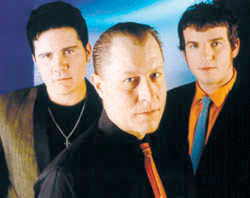 Really? That’s another great non-drinking/smoking/shooting/pedal-to-the-metal song I chalked up to wisdom of the road…
Really? That’s another great non-drinking/smoking/shooting/pedal-to-the-metal song I chalked up to wisdom of the road…
A lot of my old friends and fans remember that song from back when The Reverend Horton Heat was just a solo thing.
I thought you began as psychobilly and then slowed down.
We do different stuff. Different producers bring out different things as well. Paul (Leary, guitarist of the Butthole Surfers) really keyed in a lot on our straight rockabilly, country, and blues influences. Go figure: a guy from the Butthole Surfers is into blues and country… He wrote all the music for the Butthole Surfers songs, then Gibby comes in and writes all the words.
Did you intentionally make this record sound and feel different as some kind of return to roots?
Not really, but that was probably in the back of my mind. For Space Heater, I had to fight so hard with Interscope just to get our rockabilly and swing and country stuff on their at all, I really wanted to reclaim some of the straight rockabilly stuff that got us here, and that our fans really like. But you can’t really think about stuff like that when you sit down to write songs… So I had 30 songs, like I always do, and I sent Paul the demos we’d done in the practice room, and it was funny because all the rock songs I thought Paul would go for, none of them were on his favorites list at all. And all the songs that were kinda bluesy and I thought wouldn’t make the album were the ones he really liked. The song “Hurts Your Daddy Bad” I thought would lend itself well to that kinda Butthole Surfer echo, but Paul didn’t get that at all. And the day the engineer and I added the echo, Paul wasn’t even in the studio.
The thing that was so great about working with Paul was that, unlike most of the producers we’ve worked with – especially a guy like Al Jourgensen, he didn’t hear our songs and say, “OK, we have to layer the guitars on.” Most producers complain that when I go for a solo, there’s no rhythm guitar and the bottom falls out. But to me, the other guys play harder to make up for the bottom falling out. That’s part of our sound, and Paul keyed into that immediately. There’re only overdubs on about four of the songs, and that was just to add keyboard, acoustic guitar, or the accordion. At the same time, Paul really dug it when I did two solos in a song. In some of the demo versions, I’d go a little crazy with longer solos, but for the record, we usually try to keep the songs within a certain time frame. So I really liked working with Paul because not only did he capture my guitar sound really well, he has me playing more solos than I’ve played on any of our records. And it’s not just about guitar solos… I think the songs that were picked had really solid songwriting, and while a lot of it’s new, some of it is really old, so it comes together as very interesting as a whole.<
I noticed on the greatest hits record SubPop released, Holy Roller, quite a few of the songs were from the Interscope days.
Yeah, SubPop had to license them.
Was Interscope cool about it?
Sure, because they don’t care. They don’t think we’ll ever make anything out of ourselves. They’re glad anyone would pay 5¢ to use one of our songs. Funny thing is, back for Liquor in the Front, the joint venture between SubPop and Interscope, I went to a meeting after we did the record where everyone was all serious and everything, and one of the guys goes, “Jim, where is the guitar playing? Where is the singing on this record?” Then here we are, five or six years later, SubPop is licensing those songs they originally didn’t like from Interscope for the greatest hits! I think that kind of thing is why so many artists get fed up; the people who’re the money behind it all suddenly decide that instead of hanging tour posters, they want to tell you how to be a better band. But they don’t know how to make a song work in front of a crowd. If we try out a new song and we barely get applause, we know real quick. But labels get their egos built up because they made a few dollars, and they get into a realm they know little about.
It’s funny because if you ever look at the people who have jobs at big record labels, all of the girls are cute and stylish dressers, all the guys are good-looking and have that rock star slacker look, and if you see someone older, maybe with bad teeth or something, you know who’s doing all the work and making all the decisions. Because none of the rest of those guys can read a fuckin’ road map. On the brighter side, I’m glad to be on Time Bomb… I’m not really about record labels, and I’m not really about albums either. I barely consider albums to be an art form. I consider them to be more of an advertisement. The real art form is music, and music is not like a painting. An album tries to make music like a painting – it sits on the wall and looks back at you. Music is streamline, it goes by, it’s spiritual, it’s when the mood grabs me to play this lick, and it’s like something from the heavens hits me. If it works, it’s a beautiful moment, and if it doesn’t, well, it’s gone. That’s what music’s about.
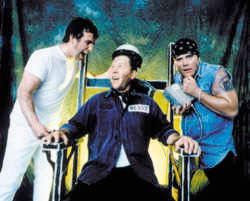 Seeing as most of us only know your recorded material (’90’s self-produced Smoke ‘Em if you Got ‘Em and ’93’s Gibby Hanes-produced The Full-Custom Gospel Sounds of… startin’ it off), tell me about the early solo days.
Seeing as most of us only know your recorded material (’90’s self-produced Smoke ‘Em if you Got ‘Em and ’93’s Gibby Hanes-produced The Full-Custom Gospel Sounds of… startin’ it off), tell me about the early solo days.
Reverend Horton Heat started out as me doing rockabilly covers, and most of my original stuff was finger-pickin’ guitar, swingin’ rockabilly… Then I started to make enough money to hire a band, and I went through a few years where my band made more money than me.
They were mostly hired guns?
Basically, yeah. Actually, Reverend Horton Heat has had seven, eight, or nine drummers. I had another upright bass player before Jimbo, but once Jimbo joined and was all gung-ho about touring and being part of the band, that was a big turning point for the band. We had to make a lot of personal sacrifices to go and camp out in someone’s living room for a few days, make no money, and have to pool our scrounged money together to get hamburgers… Jimbo joined in ’89, so he’s been a part of the band for all except the first three years…
And you seem to have trouble with drummers, huh?
I have more trouble with drummers’ girlfriends than I do with drummers.
Do you look for rockabilly drummers, metal drummers, punk drummers?
Well, to tell you the truth, I have my sound, so I basically got drummers who could do the gigs. That’s one reason we ended up with Taz. He was a drummer during the SubPop and the first Interscope records, and his favorite drummer is Tommy Lee. That goes against everything I’m all about, I can’t stand that kind of stuff… My favorite drummers are Buddy Rich and Dicky Harrel, but Taz was a buddy and he was there, and he had a good ear for the songs. So even though he was a metal drummer, he had the chops. Our current drummer, Scott, is just amazing with chops galore, and he’s got a great sense of song and style. We picked him up when he was in a folk-type thing, but he’s played with KMFDM, Sister Machine Gun, and some alternative rock stuff, but I think his favorite drummers are Gene Kroupa and Buddy Rich and stuff. I think that’s what a lot of rockabilly drummers were trying to be like.
Another thing that’s different about this record is there are fewer songs about drinking…
Yeah, only six of them. I feel real bad about that. I apologize to my fans for that.
One of my favorite songs is the one in Love & a .45, “Loaded Gun.” You really captured the sound of being absolutely morosely wasted, totally absorbed in morbid thought, barely able to keep your head from rolling off your neck…
That’s a song I’m pretty proud of. Maybe we outta get that one back if we ever do a live thing…
And while there are songs about women, most of them are sorrowful and not pissed off…
Well, when I write songs, I think about the rhythm I want, and what other songs we have like that. A lot of bands don’t think about that… I’m sure Nirvana didn’t sit around and think that “Smells Like Teen Spirit” was a funk beat. It’s an alternative song, sure, but it’s a funk beat. But I always ask myself if we have too many swing beats, too many rock’n’roll beats, too many shuffle beats, too many moderate-tempo beats… The only beats I don’t use a lot of are waltz beats. Like “400 Bucks” might not sound a whole lot like “Hurts Your Daddy Bad,” but they’re both rock’n’roll beats. That where I make my comparisons between songs.
Funny, because those two songs are miles apart lyric-wise and feel-wise.
Yeah, well, they’re all about girls…
Girls & booze, huh? Booze fills the void when there’re no girls around.
That’s exactly right. At one point in my life, I traded in girls for pool. I got a little better at pool, but I could still never play with the big boys.
One thing I always’ve wanted to ask you: the label bios always paint you as a pool hustling juvenile delinquent… How much of that is true?
Well, let me tell you… The one thing I’ve always really loved about SubPop is their great sense of marketing. Just before Smoke ‘Em if you Got ‘Em was released, a secretary called me early in the morning and woke me up. She was like (dreary, exasperated voice), “OK, I have to ask you some questions…” It was really boring. “Where were you born?” And I’m like, “Well, I was born in Fort Worth, I was adopted…” I was still mostly asleep, so I wasn’t able to give any funny answers or stories. “What do you like to do in your spare time?” And I say, “Well, I like to play pool.” And the next thing you know, Bruce Pavitt (SubPop A&M honcho) gets all this dry information and he turns my adoption into my being an orphan who spent most of his time in correctional facilities who worked his way out by becoming a pool hustler. So the whole “legend” of The Reverend Horton Heat is based on all this bogus information from the first bio. And it’s funny how sometimes real life can mimic image… Interscope through a party for me when we released Liquor in the Front, and they had it at a pool hall called Jullian’s in New York City where they did The Hustler and other pool movies. They set me up at a pool table and had people come over to interview me while playing pool. I played 15 games and didn’t lose one. I’ve never had a streak like that in my life. And toward the end, you could tell it wasn’t just writers and stuff, it was people coming up saying, “I gotta play you.” I was so in the zone, it was amazing. I don’t play pool as much anymore, but I did win $80 off Paul Leary when we were doing the recording sessions.
Speaking of which, I hear you recorded at Willie Nelson’s studio and played a bit of golf… Is golf your new sport?
Well, I try to keep that a secret because it’s bad for my image, but there’s the whole golf hustler thing, and I’m big into that. One of the most famous golf hustlers was Titanic Thompson – he made so much money hustling, that it didn’t pay enough for him to play the PGA tour. And Ben Hogan wrote letters to people saying that if Titanic Thompson wanted to bet, don’t do it because you can’t beat him. So evidently, Ben Hogan couldn’t beat this guy. There are still old guys at the golf course across the street from where I live that remember him out there, playing games worth $25-$30,000 back in the ’50s. But he was crazy, man, he had bets on everything. I’ve heard some great stories about him. For me, the golf thing, well, it’s kinda the yang to my rock’n’roll yin.
Golf also gets you out in the open air. Pool is still kinda rock’n’roll, hanging out in a smoky room with booze and broads and barroom brawls.
Golf is also the only place in the world where drinking and driving are encouraged. They give you a golf cart, they try to sell you a six-pack of beer and a Bloody Mary to top it off… It’s fun, ya know? But I’m not into the whole country club thing. The way I got into golf was when I was a kid, my first job was as a caddie. So I got to experience first-hand what I call economic discrimination. Ya know, it’s funny, people talk about racial discrimination all the time in this country, but it is nothing like economic discrimination. If you have money and a certain ego, it transcends everything… I’ve seen Black people with a lot of money who’ll treat everyone else like crap. I was a caddie, and I worked with minority groups even though I was a white guy. It’s not that my family was poor, we just weren’t country club. So there I was, working as a caddie and learning how to play golf, and the country club kids would get to play for free, while I lugged Dr. Segal’s bags for five hours to make $4. So while I’m not into the country club aspect, I do think it’d be a great sport to teach kids. We have so much of this slamba-jamba, in-your-face-motherfucker attitude, and sportsmanship has been lost. It used to be important to learn how not to be a sore loser, but now, being a sore loser is accepted, and being a flamboyant asshole winner is encouraged.
(www.reverendhortonheat.com)

